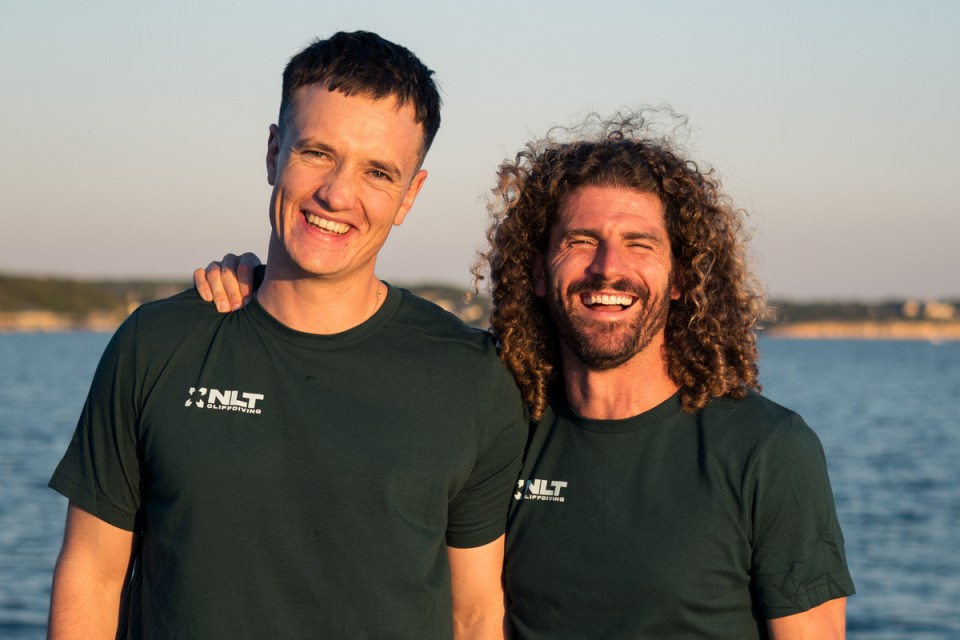
When launching a new sports property it helps to have one of the biggest names in the game lend their support and, in diving, they don’t come much bigger than Tom Daley.
So it was a timely boost to the No Limits Tour Cliff Diving Championship that former Olympic champion Daley agreed to appear in social media content this week plugging the debut event in Texas, which features friends of his and takes place today.
Cliff diving is, it is fair to say, a niche pursuit but, helped by the marketing muscle of Red Bull, whose own series has pioneered the sport and its young, hip athletes, it punches way above its weight on social channels: views of content around the extreme sport have tripled in three years to close to 1bn a year.
It’s one of the reasons why US pro diver David Colturi and London-based Austrian tech entrepreneur Raphael Eder got together to found the No Limits Tour, they tell City AM.
“There’s something unique about jumping off a cliff and flipping and twisting flying through the air that’s quite magnificent, and it looks impossible to most people,” says Colturi. “It’s super made for content.”
“It’s just cool,” says Eder, a former junior skier, who sees it as tapping into “the TikTokification of sports. All the big ones more and more measure success in their social media awareness. I think Formula 1 in 2024 produced around 10bn views on their videos, ATP tennis around 2bn, and cliff diving, with a handful of events, close to 1bn.”
‘Holy freaking shit, this is incredible’
The shaggy-haired Colturi isn’t the only cliff diver invested in the No Limits Tour. Its pro athletes, who include Carlos Gimeno, Xantheia Pennisi, Madeleine Bayon and Kaylea Arnet, have a stake and a say in its running.
Another, Harvard graduate Morgane Herculano, is not only competing but also heading up a 10-strong media team tasked with creating viral content.
Additional financial backing has come from institutional investors and esports entrepreneur Michele Attisani.
They want this weekend’s launch event to provide a proof of concept that attracts more investment, with ambitions for three more dates next year and, eventually, an eight-leg global circuit calling at locations in Europe, the Middle East and Australia as well as the US.
“Cliff diving really just requires something to jump off of and 5m of water to land in,” says Colturi.
The No Limits Tour already has sponsors – including Action Watersports, Athletic Brewing Company and premium water brand Waiakea – and the founders are confident more will flock to its 25-34-year-old audience, with or without linear broadcasting.
“Brands are shifting towards being closer to consumers and linear TV gets them as far away as they can imagine,” says Eder. “In 10 years’ time, I think we’re going to look at a completely different world.”
Ticket sales can generate further revenue, with the biggest cliff diving contest attracting crowds of 70,000. Says Colturi: “When you see it in person, it gives you that extra edge of like, ‘Holy freaking shit, this is incredible’.”
’90kmh jumps feel like you’re in car crash’
The success of Red Bull in cliff diving is a double-edged sword, amplifying the sport but also providing stiff competition for the social media eyeballs the No Limits Tour seeks.
Colturi says their offering can be “complimentary” rather than a rival, and Eder insists there is ample space in the calendar to build on the energy drink’s handful of events – and provide more earning opportunities for the sport’s daredevil athletes.
“Premier League clubs are playing more than 50 games a year. Formula 1 is 24 [races], tennis is 70 tournaments. And I think that’s exactly the opportunity here,” he says.
Ideally, a season of 40 events would allow athletes to pick around 15, thereby ensuring adequate recovery time in a sport whose physical demands can be brutal.
“When you jump from 27m you’re hitting the water at about 90kmh, and that deceleration force happens in one second,” says Colturi. “You have up to 10G forces hitting the body. Honestly, it feels like you’re in a car crash sometimes.”
The No Limits Tour’s evolution has been almost as quick as its spectacular dives. The founders only connected for the first time at the start of the year and, nine months later, are staging a pilot event.
Longer term, they hope that cliff diving could even become part of the Olympic programme and cite some compelling reasons why it may not be such a long shot.
“I think the next big wave, in 10-15 years’ time, are businesses that are non-tech. If AI takes over everything we do, then we want to have opportunities to connect more with people. Be out; watch sports,” says Eder.
“Sport is going to be one of the only things that’s still random, where you can’t predict outcomes. So I think the value of sports will grow so fast in the next couple of years and extreme sports is a sub-segment that also grows extremely fast.
“The last couple of years, what got added to the Olympics was surfing, skateboarding, breakdancing. Why? Because people watch those sports. People engage with them. They are cool. They’re awesome.”








